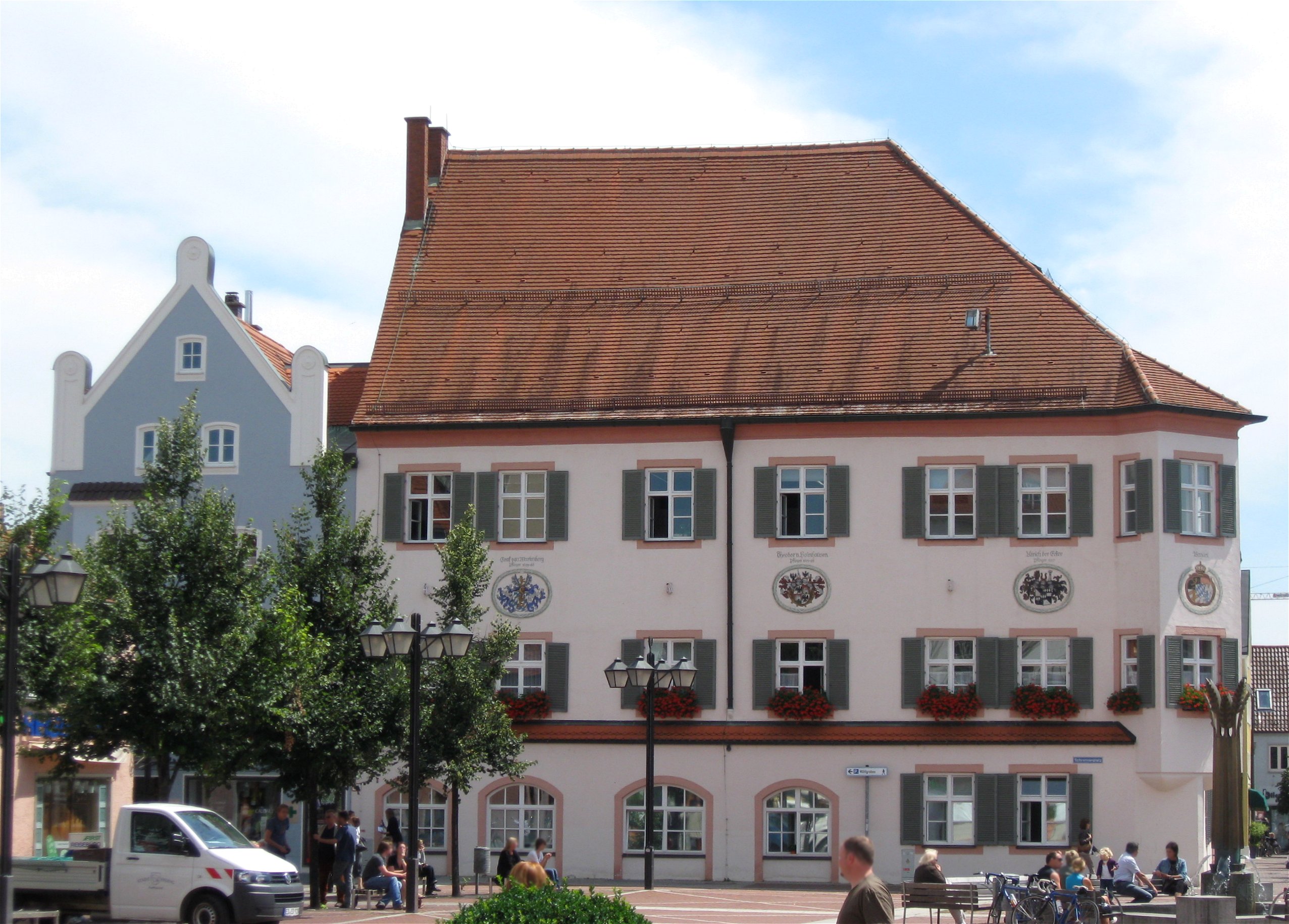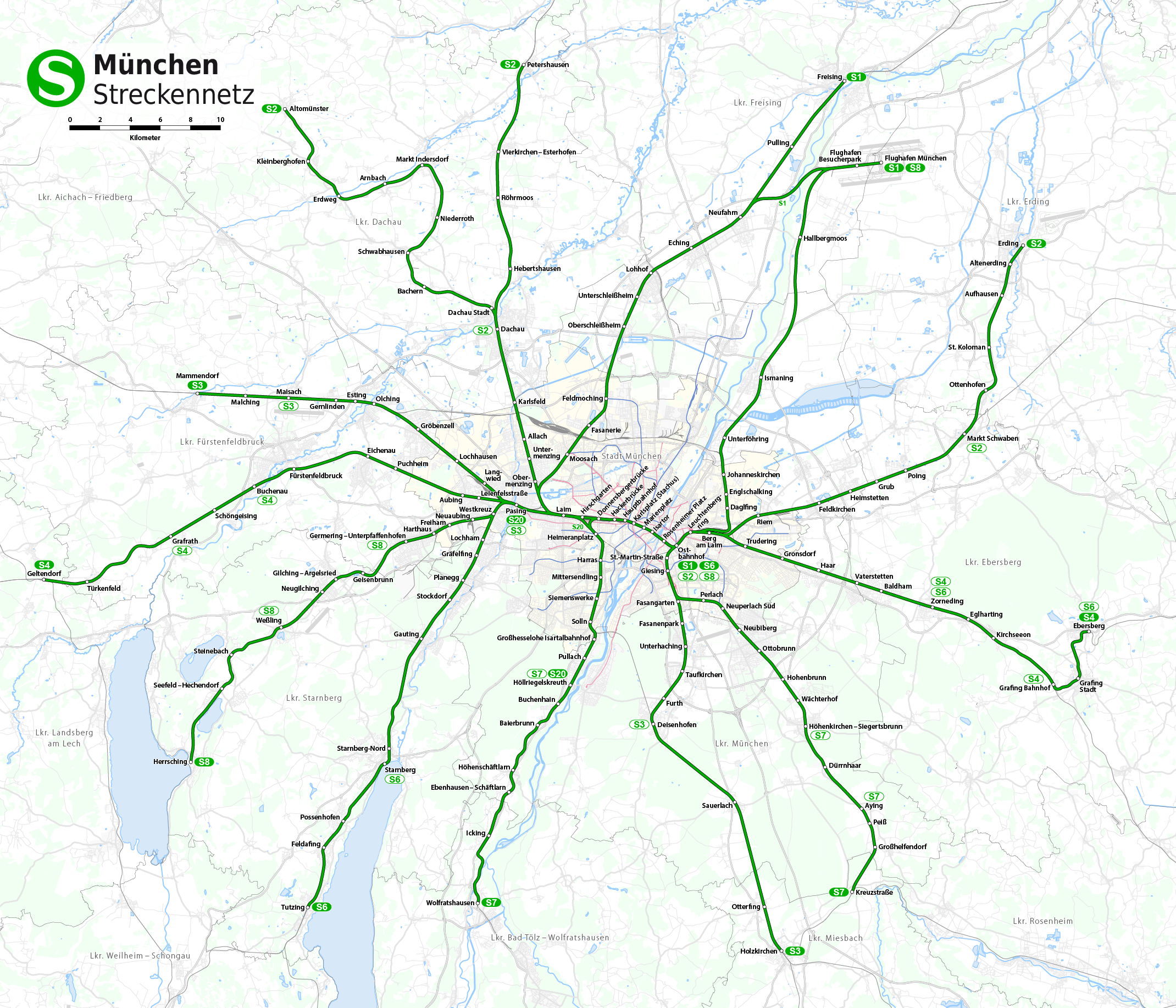|
Erding
Erding () is a town in Bavaria, Germany, and capital of the rural district of the same name. It had a population of 36,469 in 2019. The original Erdinger Weissbier is a well-known Bavarian specialty. Erding is located around 31 kilometers northeast of central Munich, about a 30-minute drive by car. Regular S-Bahn trains connect to Munich and beyond. History Evidence of prehistoric hunter/gatherers in the Erding area dates to c. 6000 BC, findings including an axe made of deer antler. Excavations of two dwellings of at least 6.5 metres in length near Altenerding from c. 2500 BC provide the first evidence of permanent agricultural based inhabitants, while some twenty early Bronze Age graveyards from c. 1800 BC have been found in Langenpreising. Erding was founded in 1228–1230, developing as a township on an alternative route from Landshut to Munich. Erding became known as a border town, midway between the two rival cities. During the Thirty Years' War, Erding was taken twice ... [...More Info...] [...Related Items...] OR: [Wikipedia] [Google] [Baidu] |
Munich Airport
Munich International Airport- Franz Josef Strauß (german: link=no, Flughafen München) is an international airport serving Munich and Upper Bavaria. It is the second-busiest airport in Germany in terms of passenger traffic after Frankfurt Airport, and the ninth-busiest airport in Europe, handling 47.9 million passengers in 2019. It is the world's 15th-busiest airport in terms of international passenger traffic, and was the 38th-busiest airport worldwide in 2018. It serves as hub for Lufthansa including its subsidiaries Lufthansa CityLine, Air Dolomiti and Eurowings as well as a base for Condor and TUI fly Deutschland. The airport is located northeast of Munich near the town of Freising. It is named after former Bavarian minister-president Franz Josef Strauss. It has two passenger terminals with an additional midfield terminal, two runways as well as extensive cargo and maintenance facilities and is fully equipped to handle wide-body aircraft including the Airbus A380. H ... [...More Info...] [...Related Items...] OR: [Wikipedia] [Google] [Baidu] |
Therme Erding
Therme Erding is the largest thermal bath complex in Europe. It is 30 minutes northeast of Munich by car and is visited by around 4000 people every day. History On 12 February 1983, the American oil company Texaco drilled below ground, just outside the town of Erding, Bavaria, Germany. Instead of oil, they discovered sulphorous water. Initially a 'mini thermal bath complex' was constructed on the site, and then the foundation stone of Therme Erding was finally laid on 10 November 1998, and it was officially opened on 3 October 1999. The complex has a clothed bathing area, and a no-clothing sauna section. In 2007, Therme Erding underwent an expansion. On 31 March 2007, the waterslide section "Galaxy" opened, making it one of the biggest indoor waterslide parks in Europe. The newly expanded "Saunaparadies" reopened the same day which, with an area of , became the largest sauna complex in the world. Both these extensions meant that Therme Erding more than doubled in size, inc ... [...More Info...] [...Related Items...] OR: [Wikipedia] [Google] [Baidu] |
Erdinger
The Privatbrauerei Erdinger Weißbräu Werner Brombach GmbH (also known as Erdinger Weißbräu) is a brewery in Erding, Germany. Its best-known products are its namesake Weißbiers (wheat beer). History Erdinger is the world's largest wheat beer brewery. It is widely available and popular across Germany and the European Union. Erdinger was founded in 1886 by Johann Kienle. Erdinger beer is the best-known culinary product of the town; however, the brewery did not receive its current name until 1949 from its owner Franz Brombach, who had acquired the brewery 14 years earlier. The current owner is Franz Brombach's son, Werner Brombach (since 1975). Currently, there are ten varieties available: * Weißbier: a golden cloudy beer (ABV 5.3%, white/cream label, pictured) * Dunkel: a dark brown type (ABV 5.6%, black label),(5.3% in export bottle) * Kristallweizen (crystal clear): a filtered Weißbier (ABV 5.3%, silver label) * Pikantus (picaanthus): a dark weizenbock beer (ABV 7.3%) ... [...More Info...] [...Related Items...] OR: [Wikipedia] [Google] [Baidu] |
Erding (district)
Erding (german: Erding, bar, Arrdeng) is a ''Landkreis'' (district) in Bavaria, Germany. It is bounded by (from the north and clockwise) the districts of Landshut, Mühldorf, Ebersberg, Munich and Freising. History The region is one of the oldest parts of Bavaria. Erding was located on the way between two important centres of power in the Wittelsbach state, Munich and Landshut. About 1230 a castle was built on the river Sempt in order to secure the road. This castle grew to become the town of Erding. The district of Erding was founded in 1946. Slight modifications took place in the administrative reform of 1971, when some villages from neighbouring districts were awarded to Erding. Geography The district covers agriculturally used areas northeast of Munich. Several affluents of the Isar River cross the district from south to north, among them the Sempt. In the northwest there is the Erdinger Moos, which was once a large fen. A substantial part of this swampy area was drained in ... [...More Info...] [...Related Items...] OR: [Wikipedia] [Google] [Baidu] |
Munich S-Bahn
The Munich S-Bahn (german: S-Bahn München) is an Railway electrification system, electric rail transit system in Munich, Germany. "S-Bahn" is the German abbreviation for ''Stadtschnellbahn'' (literally, "urban rapid rail"), and the Munich S-Bahn exhibits characteristics of both rapid transit and commuter rail systems. The Munich S-Bahn network is operated by S-Bahn München, a subsidiary of DB Regio Bayern, which is itself a subsidiary of the German national railway company, Deutsche Bahn. It is integrated into the Munich Transport and Tariff Association (''Münchner Verkehrs- und Tarifverbund'', MVV) and interconnected throughout the city with the locally owned Munich U-Bahn. Today, the S-Bahn covers most of the populated area of the Munich metropolitan area of about 2.7 million inhabitants. The Munich S-Bahn was established on 28 May 1972. It was intended as part of the scheme to provide an adequate transport system during the 1972 Summer Olympics held in Munich by connecting ... [...More Info...] [...Related Items...] OR: [Wikipedia] [Google] [Baidu] |
Philipp Bönig
Philipp Bönig (born 20 March 1980) is a German former professional footballer who played as a left-back, and a manager. Career Youth Born in Erding (Bavaria), West Germany, Bönig started to play football at the local club Eintracht Freising. His first position was keeper but after a couple of matches he moved to the left offensive midfield. Two of his brothers are also football players: his brother Sebastian played more than hundred matches in the second Bundesliga for LR Ahlen and Union Berlin, and his youngest brother Vincent played in the second team of FC Ingolstadt 04. After impressing as a junior, Bönig joined Bayern Munich as a 14-year-old in 1994 and played there for seven years. In the last year he established himself in the second team of the club which played in the Regionalliga. While playing at Bayern Munich, Bönig made twenty starts for the German national youth teams. MSV Duisburg In 2001, Bönig started his professional career at MSV Duisburg in the 2. Bund ... [...More Info...] [...Related Items...] OR: [Wikipedia] [Google] [Baidu] |



